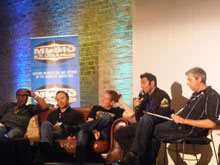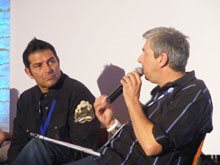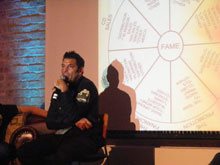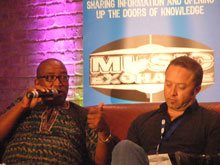The third and final panel of day two at the 2010 Music Exchange in Cape Town, comprising a number of experienced professionals in the music industry, were put a number of questions by Martin Myers, co-organiser of the second annual conference. The event took place at the Protea Hotel Victoria Junction from 22 - 24 March 2010.

L-R: Sipho Mabuse, Sean Wienand, John Langford, Doug Davenport and Mike Myers
The panel featured John Langford, COO, Big Concerts; Sean Wienand, MD, Headline Artists; Doug Davenport, manager, Evolver One and Sipho Mabuse who discussed which team member in an artists array of management plays the most pertinent role.
Making an assault
Davenport was asked how he went about booking gigs for his band Evolver and how he managed to have organisers and venue owners buy into his band. He described his tactics as an "assault" of phone calls as well as consistently sending through the bands music in order to build a relationship with the relevant people so that they become comfortable in dealing with him. “Venues don't like to pay,” said Davenport so sometimes the band does perform gigs letting people in for free or asking for a flat fee. He prefers handling everything case by case.
Headliners decide support acts
Langford, whose company has brought many an international star to South Africa and is the organiser of the popular Cokefest aka Coke Zero Fest, provided some insight as to how support acts are chosen to play with international headliners. The simplest way is through recording companies says Langford, a proposal is then submitted to the headliners management for approval. The bottom line is that 85 - 90% of the total revenue goes to the headline artist, according to Langford. In terms of Cokefest however, the sponsor, Cocoa-Cola and media partner, usually 5FM, play a significant role in which plans are invited to perform.
Prerequisites to management
Wienand discussed the criteria he looks at when deciding whether to manage an artist. One of the prerequisites is that the artist is able to get "feet through the door" or if you are at a critical mass stage where you are undeniably valuable at any venue or festival and you are asked for by a promoter rather than the other way around.
7th Son are currently making a name for themselves in Germany after making use of the networking opportunities at last years Music Exchange conference. Wienand, who has the band on his books, says he built significant relationships with people and with contacts in other territories describing the band's success as a result of a snowball effect after partnering with the right people. And being in the business for five years naturally the seeds he planted at the beginning are now starting to bear fruit.
Dependence on promoters - a fallacy
Mabuse believes that the dependency that artists have on promoters is a "fallacy": "If you want to be in business put up your money," said the veteran artist. Artists should have an available cash flow as there are costs in staging shows but playing at schools and universities locally should also be an option. Wienand agreed saying services come at a price and it is an investment of your money.
Andy Mac, lead singer in Flat Stanley, after touring much of Europe and the States, noted that support acts sometimes pay the headline artist overseas in order to play with them; it's all about weighing up the value of the exposure gained and deciding whether it is worth it - yes, you might need to invest your own money, but make sure it is a profitable investment in the end: “Turn it into a tangible return by selling out your own shows," says Mac. Plus you can make all sorts of connections as a support act.
The Wheel of Fame
Davenport introduced attendees to his "Wheel of Fame" which consists of many elements musicians and their teams should focus on and members need to focus on their delegated areas in order to build up to that critical mass stage.
These elements consist of:
- Live gigs - most important as it serves as the financial engine
- Live appearances
- Online activity
- Recording
- Promotions
- Finances
- Music videos
- CD sales
All aspects of the wheel must be pushed simultaneously says Davenport. The Wheel of Fame model is available on www.musicexchange.co.za.
Will the 2010 FIFA World Cup also prove profitable for the arts and culture industries of South Africa?
Big Concerts doesn't have anything huge planned due to a strategic decision taken by the company. It will, however, host an exclusive gala dinner and handover to Brazil ceremony that, according to Langford, will feature a couple of big name artists. Wienand noted that certain industries will benefit from the event but he's not sure about the music industry and there really is no need to take any financial risks - it will be business as usual he says. Mabuse agreed that there will be nightlife activity in smaller venues, during the sporting event, but it is not worth hosting huge festivals.
Big break brought on by manager
Mabuse believes a manager and lawyer are the most critical players for any artist while Wienand decided that it should be an all-round team effort as best results come from cohesive work. Langford believes talent should be the focal point while Davenport went with an honest team leader who is able to lead, delegate and plan.
Nick Matzuckis, reknowned music industry lawyer and speaker at the conference, seated amongst the audience, said you will need a lawyer during negotiating a contract and to handle disputes, but other than that you don't need one. You can be superbly talented but your big break will ultimately be brought on by your manager.
For more information, go to www.musicexchange.co.za.
View pics from day two of the conference




















































